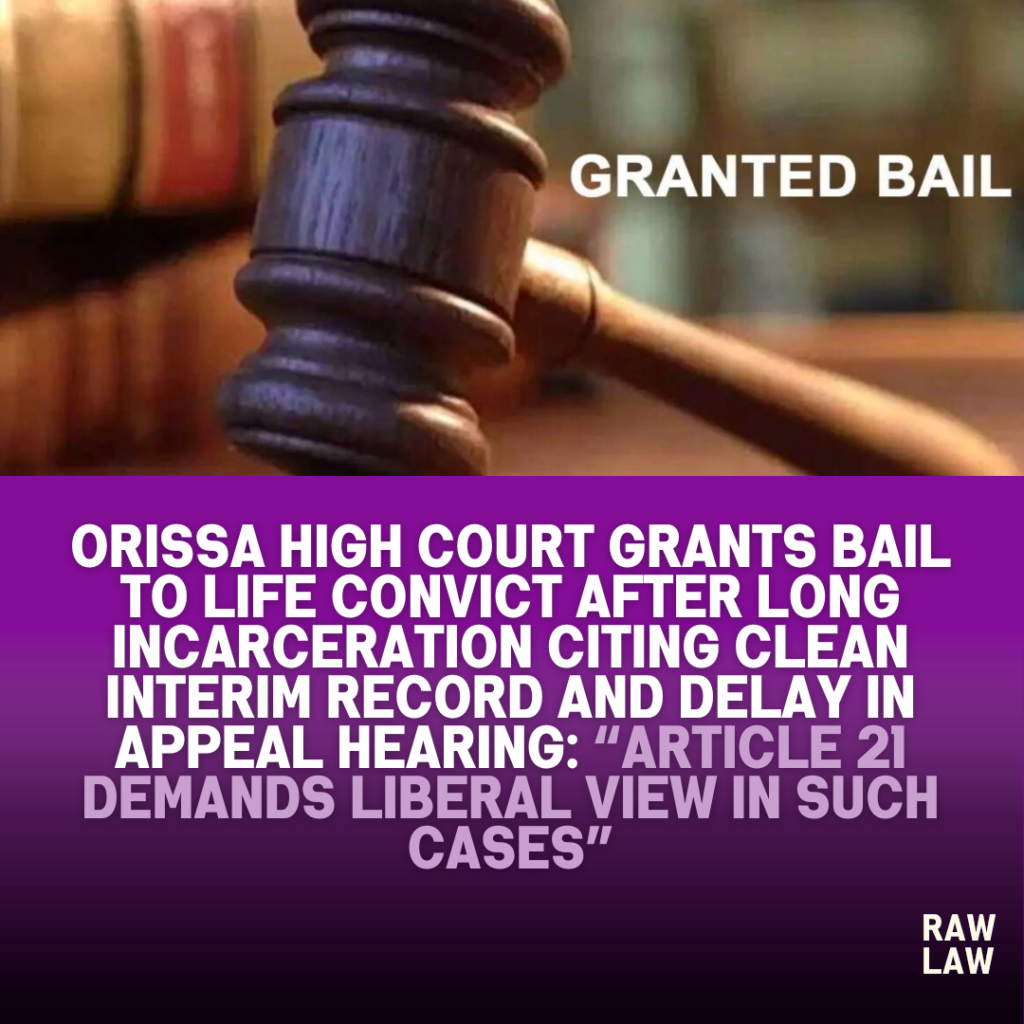Court’s Decision
The Orissa High Court granted regular bail to a life convict under Section 389 of the Code of Criminal Procedure after noting that he had already spent over 11 years in custody, exhibited good conduct during a prior interim bail, and that his appeal was unlikely to be heard soon. Relying on the decision in Leti @ Jayadeb Roy v. State, the Court directed his release on a bail bond of ₹20,000 with one local solvent surety, subject to a condition that he shall not indulge in any criminal activities. The application for bail was accordingly disposed of.
Facts
The petitioner was convicted under Sections 341, 302, 201, and 34 of the Indian Penal Code, along with Sections 25 and 27 of the Arms Act. He was sentenced to life imprisonment along with various other concurrent sentences and fines. He had earlier been granted interim bail for three months, during which no adverse conduct was reported against him by the local police. The petitioner had been in custody since 3 December 2012.
Issues
Whether the petitioner, who has been convicted and sentenced to life imprisonment, is entitled to be released on bail under Section 389 of the Code of Criminal Procedure considering the delay in hearing of the appeal and his good conduct during interim bail.
Petitioner’s Arguments
The petitioner contended that he had already undergone significant incarceration since 2012 and there was no likelihood of his appeal being heard in the near future. He referred to the Court’s earlier order granting him interim bail, which he had complied with without any misconduct. He relied heavily on the precedent set in Leti @ Jayadeb Roy v. State, where convicts undergoing long detention due to pending appeals were considered for bail under Article 21 of the Constitution.
Respondent’s Arguments
The State counsel was directed by the Court on the previous date to obtain instructions regarding the conduct of the petitioner during interim bail. Based on the written communication from the Inspector-in-Charge of Brajarajnagar Police Station, it was submitted that there was no adverse report against the petitioner during his interim bail.
Analysis of the Law
The Court assessed the application under Section 389 of the Code of Criminal Procedure, which empowers the appellate court to suspend the execution of a sentence during the pendency of an appeal and release the appellant on bail. The Court also analyzed Article 21 of the Constitution in light of the Leti case, which held that extended detention of convicts awaiting disposal of appeals should be viewed liberally to uphold the right to life and personal liberty.
Precedent Analysis
In Leti @ Jayadeb Roy and Another v. State, reported in (1990) 3 Orissa Criminal Reports 427, the Orissa High Court had emphasized that under Article 21, courts must take a liberal view in granting bail to convicts languishing in jail due to delayed hearings of their appeals. The judgment stated that in run-of-the-mill cases, temporary release for a few months could be granted initially to monitor behavior, and full bail could follow if no misconduct is reported. This precedent was central to the present decision.
Court’s Reasoning
The Court noted three key factors: (i) the prolonged judicial custody of the petitioner since December 2012, (ii) the clean record during the interim bail period, and (iii) the applicable ratio in the Leti case. These factors collectively justified granting bail. The Court remarked that there were no allegations of breach of bail conditions earlier, and thus, there was no basis to assume that the petitioner would misuse the liberty now.
Conclusion
The Court allowed the bail application, granting release on furnishing a bond of ₹20,000 with one local solvent surety, subject to the condition of non-indulgence in criminal activity. The Court warned that breach of conditions would result in cancellation of bail. The interlocutory application was accordingly disposed of.
Implications
This judgment reaffirms that long-term undertrial or convict incarceration during pendency of appeals can be grounds for bail under Article 21. It provides a precedent for future bail applications where delay in disposal of criminal appeals and good interim behavior are factors. The decision also strengthens the principle of temporary bail as a viable mechanism to test compliance before granting regular bail.
Judgment Referred and its Reference in the Case
- Leti @ Jayadeb Roy and Another v. State, (1990) 3 Orissa Criminal Reports 427:
The Court relied on this case for the proposition that Article 21 mandates a liberal approach in bail matters when a convict has spent considerable time in custody and the appeal is not being heard soon.
FAQs
- Can a life convict be granted bail during appeal?
Yes, under Section 389 CrPC, a life convict may be granted bail during the pendency of appeal if factors such as long incarceration and good conduct are present. - What was the role of Article 21 in this judgment?
Article 21 was interpreted to require liberal consideration for bail in cases of prolonged imprisonment due to delayed appeals, especially when interim bail showed good conduct. - Why was the Leti @ Jayadeb Roy case important? The Court heavily relied on it to support its view that temporary release followed by full bail is justified when there is prolonged custody and no misuse of liberty.
